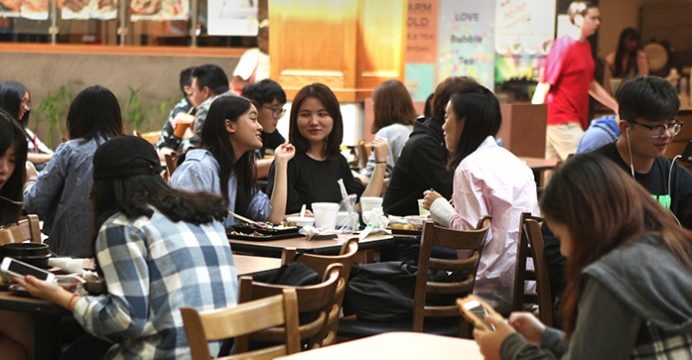
Students eat lunch in the food court of the Old Capitol Mall on Monday, September 12, 2016. International students account for more than 12% of the University of Iowa's student body—more than double the population since 2002. (The Daily Iowan/Olivia Sun)
By Marissa Payne, The Daily Iowan
For many international students, the struggles of adjusting to a new environment can be emotionally and mentally daunting.
When students come here from other countries, they face the challenge of adjusting to a new environment, UI student Jingwen Liu said, the president of Heart Workshop.
The student organization aims to raise awareness surrounding mental health while helping international students adjust to the local environment. The struggles these students face can affect their social-networking opportunities and mental health, Liu said.
“Some students feel a little bit lonely if they stay here,” UI student Chunqing Cao said, the secretary of Heart Workshop.
According to the data from the International Student & Scholar Services, 4,540 international students were enrolled at the UI in the fall of 2015.
Scott Liu, a staff psychologist at the University Counseling Service, said the independent nature of education in the United States combined with some international students’ reluctance to express their needs can make it easy for their problems to go on untreated.
“Here, you can be a ghost,” Scott Liu said. “If you don’t say anything, nobody will notice; you can just go to class and leave.”
While he said the stigma surrounding mental health is a universal problem, he also noted a difference in education about mental health in other countries. In China, he said, people sometimes associate individuals with mental-health problems with criminal activity.
“Before I came here, I didn’t realize the importance of mental health,” said Jingwen Liu, who is from China. “In our culture, we’re used to doing things ourselves. When we’re facing a problem, the first thing Chinese students think is not counseling but dealing with it themselves. We’re afraid of that.”
Students such as her work to combat the issue of isolation through their efforts in Heart Workshop.
“Every member who comes into our group, they probably have some social phobia, or they’re afraid of talking to people or just meeting people, but after they get into our group, they feel like they have a home here,” she said.
The Counseling Service also offers an international student conversation group specifically cateredto the international students so they have a place to discuss concerns regarding their transition to life at the UI and in the United States in general.
“They can talk about their experiences so they don’t feel alone; you don’t feel like, ‘I’m the only one who struggles,’ ” Scott Liu said.
Additionally, Counseling Service plans on hiring new people for its staff, hoping to accommodate more international students, he said.
For now, he said, they try to get the word out about their services largely through summer and winter orientation programs.
“We provide a lot of information … about what are mental-health services in this part of the world and what will be signs or situations or difficulties that you experience that would be appropriate to talk to a mental-health professional,” he said.
Regardless of the problems students are dealing with — whether it’s stress, loneliness, or something else — Jingwen Liu said she wants students to realize they should access resources to get help for their mental health when they need it.
“They don’t see how serious those mental-health things are,” she said. “Sometimes, those mental health illnesses, just like physical health illnesses, you can’t deal with it yourself.”